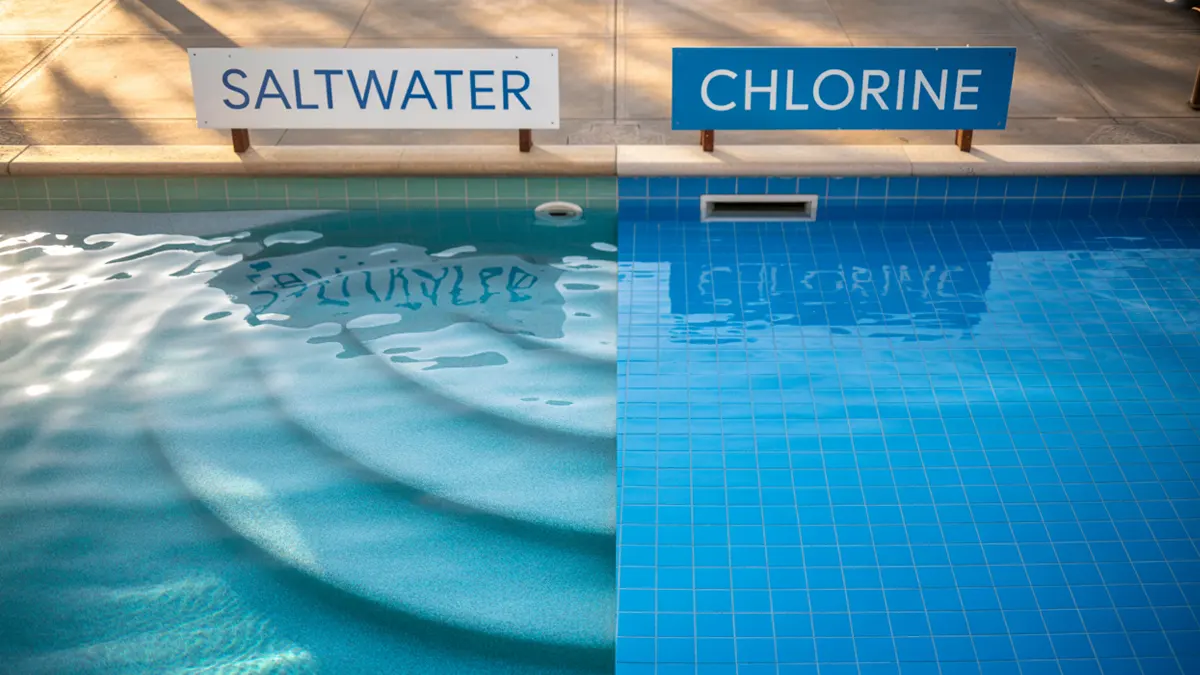
When it comes to designing your backyard dream pool, the water that you swim in is just as important as how it looks. One of the very first things you’ll be deciding between is whether to get a saltwater system or a traditional chlorine pool. Both may have the same ultimate goal—keeping your pool clean and safe—but they use vastly different means to achieve this.
Whether you’re starting fresh or thinking of switching systems, this deep dive will help you understand the differences and decide what’s best for your home, family, and lifestyle.
Understanding the Basics
What Is a Saltwater Water Pool?
Even with the name, saltwater pools are not chlorine-free. Rather than adding chlorine manually, the systems employ a salt chlorine generator that, via electrolysis, turns salt into chlorine. Chlorine levels are reduced and more stable, producing water that is commonly said to be softer and kinder to skin, eyes, and swimsuits.
What Is a Chlorine Pool?
Traditional chlorine pools rely on you. Yes, to manually add chlorine in the form of tablets, granules, or liquid. You’ll need to test the water regularly and adjust chemical levels to keep things in balance. It’s the classic method and has been around for decades.
Pros and Cons
Saltwater Pools
Pros:
- Softer Water: Salt water pools are gentler on the skin and eyes, making for a more comfortable swim.
- Less Chemical Handling: You won’t have to store or handle as many chemicals, which many pool owners appreciate.
- Steady Chlorine Levels: Automated systems create chlorine as needed, so you get fewer spikes and dips in water quality.
- Lower Ongoing Costs: After the initial setup, you’ll typically spend less on chemicals each year.
Cons:
- Higher Initial Cost: The salt chlorine generator and installation aren’t cheap.
- Potential Corrosion: Salt can be corrosive to certain materials like metal fixtures or some types of stonework.
- Complex Repairs: If the generator fails, repairs or replacements can be more involved and expensive.
Chlorine Pools
Pros:
- Lower Startup Cost: Chlorine systems are more budget-friendly to install.
- Highly Effective Sanitization: Chlorine is a powerful disinfectant that kills bacteria and algae quickly.
- Easier to Repair: Parts are widely available, and most pool technicians are familiar with chlorine systems.
Cons:
- Frequent Maintenance: Regular testing and chemical balancing are a must to keep water safe and clear.
- Chlorine Odor and Irritation: High levels or poor maintenance can lead to red eyes, dry skin, and that familiar “pool smell.”
- Chemical Storage Needs: You’ll need a safe, dry place to store chlorine products.
Cost Comparison
Installation Costs
- Saltwater Pool: The salt system itself typically costs $2,000–$2,500 on top of standard pool construction costs.
- Chlorine Pool: Setting up a traditional system usually falls between $300–$700.
Ongoing Maintenance
- Saltwater Pool: You’ll spend less annually on chemicals, but plan on replacing the salt cell every 3–7 years at a cost of $500–$800.
- Chlorine Pool: Expect to spend $300–$800 per year on chlorine and other water-balancing chemicals.
Health and Comfort
Salt water is usually termed as “softer,” something that most swimmers prefer. It’s also less prone to irritating your eyes or that dry, scratchy sensation on your skin after swimming. Small children and people with sensitive skin are usually the ones who prefer salt water as the more enjoyable option.
Conversely, chlorine pools are highly effective at ensuring hygiene, particularly if well-balanced. Nevertheless, if levels fluctuate too significantly, the water may become irritating. It all depends on how well-maintained the system is.
Learn More: How Long Does It Take to Build a Pool in Las Vegas? Timeline Explained
Maintenance and Convenience
Saltwater Pools
- Less Hands-On Work: The system creates chlorine automatically, reducing your workload.
- Still Requires Monitoring: You’ll need to check salt levels, pH, and occasionally shock the pool.
- Lower Maintenance Frequency: Fewer chemical adjustments are needed week to week.
Chlorine Pools
- More Manual Work: Be ready for regular testing and chemical additions.
- Higher Risk of Algae: If chlorine levels drop or the water gets imbalanced, algae can creep in quickly.
- More Time-Intensive: Expect to check and tweak the water several times a week, especially during peak swimming season.
Environmental Impact
Saltwater systems require fewer chemicals in total, which is, of course, more environmentally sustainable in the long term. Still, saltwater disposal, especially when draining, must be carried out with caution to prevent damaging plants or concrete.
Chlorine pools produce more trash in the shape of plastic containers and chemical effluent; however, they are simpler to deal with in communities that have strict water disposal policies.
How Pool R US Can Help
Still not sure where to turn? That’s where Pool R US is here to help. We work with both salt water and chlorine pool systems and can take you through every step of the decision-making process—everything from system selection through installation and ongoing maintenance. Our skilled technicians understand the ins and outs of both and can help you steer clear of pitfalls, saving you time, money, and aggravation.
Whether you’re building a project from scratch or looking to upgrade your current setup, Pool R US offers tailored advice and quality work to make your dream pool a reality.
Final Thoughts: Which Pool Is Right for You?
There is never a one-size-fits-all solution to the saltwater vs. chlorine dilemma. Saltwater pools provide convenience, reduced chemical handling, and long-term cost savings—but they come with higher upfront costs. Chlorine pools are proven, less expensive to installl, and easier to repair—but they need more hands-on maintenance.
Ultimately, your choice should be one that depends on what is most important to you: convenience, price, maintenance, or swimmer comfort.
When unsure, let Pool R US assist you in balancing your choices and installing a system designed for your lifestyle. Pool ownership, after all, should be about enjoying your water, not stressing about what’s in it.